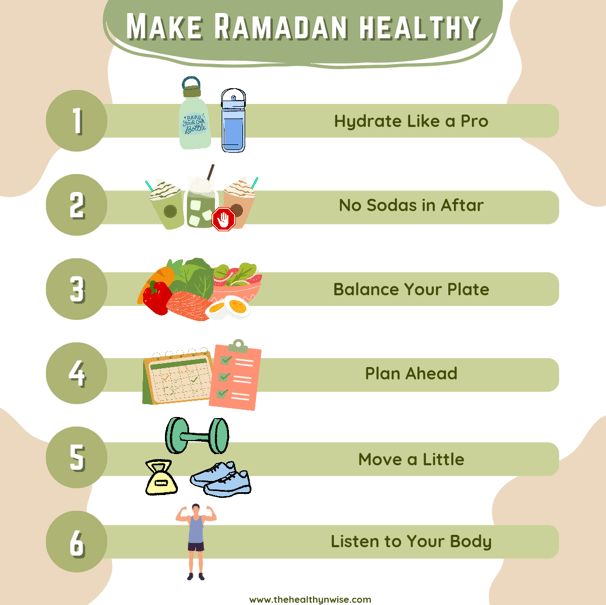Ramadan Diet Habits That Can Wreck Your Health (And How to Fix Them)
Avoid common Ramadan diet mistakes like overeating and fried foods—discover healthier habits to feel your best this holy month! 🌙✨
Ramadan is a beautiful time for reflection, community, and spiritual growth. But let’s be real—when it comes to food, things can get a little messy. After hours of fasting, it’s easy to fall into habits that feel satisfying in the moment but can leave you feeling sluggish, bloated, or even worse. From chugging sodas at iftar to collapsing on the couch right after eating, some common Ramadan practices can do more harm than good.
Chugging Soft Drinks at Iftar: The Sugar Trap
We’ve all been there—you break your fast with a cold, fizzy soda, and it feels like heaven. But here’s the thing: that sugary drink is a sneaky saboteur. It spikes your blood sugar, leaves you crashing an hour later, and does absolutely nothing to hydrate you. Plus, the carbonation can make you feel bloated and uncomfortable. Instead, try a refreshing glass of water with a slice of lemon or cucumber. If you’re craving something sweet, go for a natural fruit smoothie. Your body will thank you.
Lying Down Right After Eating: The Post-Iftar Crash
Overeating at Iftar:
The Feast Frenzy
After a full day of fasting, it’s tempting to go all out at iftar. But piling your plate sky-high can overwhelm your digestive system, leaving you feeling like a stuffed turkey. Overeating can lead to indigestion, heartburn, and even weight gain—definitely not the vibe you’re going for during Ramadan. Start small: break your fast with dates and water, then give yourself a few minutes before diving into the main meal. Your stomach will have time to adjust, and you’ll enjoy your food way more.
The Bottom Line
Ramadan is about more than just food—it’s a time to nourish your soul and strengthen your connection with your faith. By making small, mindful changes to your diet and habits, you can enjoy the month feeling your best. So, ditch the soda, skip the fried food frenzy, and take care of your body. After all, it’s the only one you’ve got. 🌙✨
Let’s talk about these habits, why they’re risky, and how to make healthier choices without sacrificing the joy of the season.
Fried Food Overload:
The Iftar Temptation
Fried foods are a Ramadan staple, and let’s be honest, they’re delicious. But eating too many samosas, pakoras, or fried spring rolls can lead to weight gain, high cholesterol, and digestive issues. Instead of deep-fried everything, try healthier alternatives like baked samosas, air-fried veggies, or grilled kebabs. You’ll still get that satisfying crunch without the extra grease.
You've just finished a hearty iftar meal, and all you want to do is lie down and scroll through your phone. Sounds familiar, right? But here’s the catch: lying down right after eating can trigger acid reflux and heartburn. Your digestive system needs gravity to do its job properly, so give it a hand by staying upright for at least 30 minutes. Better yet, take a short walk. It’ll help with digestion and keep you feeling light and energized
Skipping or Mishandling Medications: The Silent Risk
If you’re on medication for conditions like diabetes or high blood pressure, fasting without adjusting your meds can be dangerous. For example, taking diabetes medication without eating can cause your blood sugar to drop too low, leading to dizziness or even fainting. Similarly, skipping blood pressure meds can spike your levels. Talk to your doctor before Ramadan to create a plan that works for you. Your health comes first—always.
How to Make Ramadan Healthier
Hydrate Like a Pro: Drink plenty of water between iftar and suhoor. Add a splash of flavor with mint, lemon, or berries to keep things interesting.
Balance Your Plate: Include protein, fiber, and healthy fats in every meal. Think grilled chicken, whole grains, and plenty of veggies.
Listen to Your Body: Eat slowly and stop when you’re satisfied, not stuffed.
Move a Little: A 10-minute walk after iftar can do wonders for your digestion and energy levels.
Plan Ahead: Prep healthy suhoor and iftar meals in advance to avoid last-minute unhealthy choices
Explore More

Subscribe
Get new blogs in your Emails












